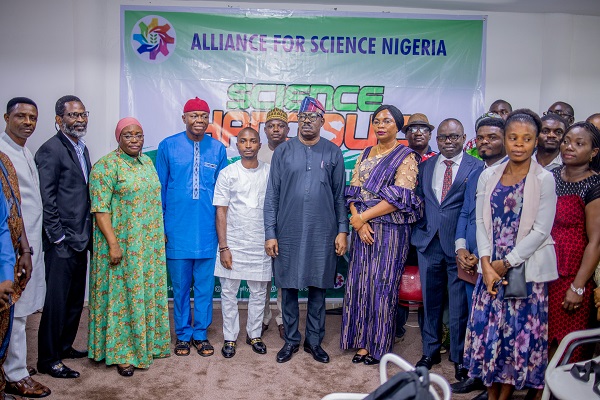
The director-general of the National Biosafety Management Agency (NBMA), Dr. Rufus Ebegba, has revealed that Nigeria has built a world-class biosafety regulatory process for biotech regulation which now serves as a model for other African countries.
He made this assertion during the Science Hangout, themed “Nigeria Biosafety Regime for GMOs” organised by the Alliance for Science Nigeria in collaboration with the NBMA and the Open Forum on Agricultural Biotechnology (OFAB), Nigeria chapter, over the weekend in Abuja.
Ebegba maintained that biosafety is a safety and economic enabler of national development which helps to assess what humans consume. He added that the NBMA ensures that products of biotechnology, such as genetically modified crops approved in Nigeria are safe for the environment and humans and are of economic value to the nation.
“All the GMOs that we have approved in the country are safe. The development and process of GMOs can take up to 13 years before they are released into the market.
“The role of NBMA is risk assessment, risk management and risk communication – the pillars of biosafety,” he pointed out.
He insisted that the agency follows all due processes and carries out a myriad of tests to confirm products of biotechnology released in Nigeria are safe and that is why detractors of the technology cannot get an edge over its regulatory decisions.
According to him, a group of 17 civil society organisations took the agency to court because of the approval for the commercial release of cotton but lost when their case was thrown out because the agency followed all due processes before approval was given for the crop.
The NBMA boss urged Nigerians to trust the decisions of the agency and rest assured that the agency would always maintain the highest standards in approving the release of any biotechnology product in Nigeria. Such products, he said, will be certified safe for Nigeria and her citizens before release.
In her remarks, the country coordinator, OFAB Nigeria chapter, Dr. Rose Gidado, underscored the importance of deploying biotechnology to tackle food insecurity in Nigeria. She added that biotechnology can help enhance agricultural productivity, given how germane it is for Nigeria to harness the potential made available by the technology to feed her growing population.
According to her, although biotechnology has been deployed in enhancing some food crops like cowpea and Bt cotton, many other crops like sorghum, rice, maize and others are still coming through.
Gidado maintained that modern agricultural biotechnology is safe, stressing that Nigeria has one of the best biosafety regulations in the world. According to her, we have other African countries coming to understudy the successes we have recorded in Nigeria, so that they can replicate the same in their countries.
She identified ignorance and misinformation as one of the challenges being faced by the technology, adding that Nigerians who kick against biotech do so ignorantly.
Earlier, the convener of the meeting, Mr. Opuah Abeikwen and a fellow of the Alliance for Science said the event aimed to sensitise the public on genetically-engineered crops in the country.
“The Alliance for Science Nigeria is a body of stakeholders that seeks to promote access to scientific innovation as a means of enhancing food security, improving environmental sustainability and raising the quality of life of Nigerians,” he said.
Abeikwen thanked NBMA for approving some GMOs in the country like cowpea and urged the media to help build trust and increase public confidence around this technology, to improve a solution to the food crises bedevilling the country.
“Biosafety and biotechnology are sophisticated. Thus, public enlightenment on its uses, benefits and contribution is crucial to enhancing food security and ensuring its successful adoption,” he stated.
He explained that the challenges of food insecurity are a fundamental problem requiring urgent attention, as Nigeria is the highest consumer of beans in the world.
Similarly, the director of Citizens Advocacy for Social and Economic Rights (CASER), Barr. Frank Tietie, said science has been trusted in the protection of food.
“Science has improved a lot; it promotes the welfare and well-being of humans. Science is responsible for development and it helps us to enjoy life. “Our position is to promote and protect humanity. We don’t need to be hungry, whereas we trust science in every area,” he added.

